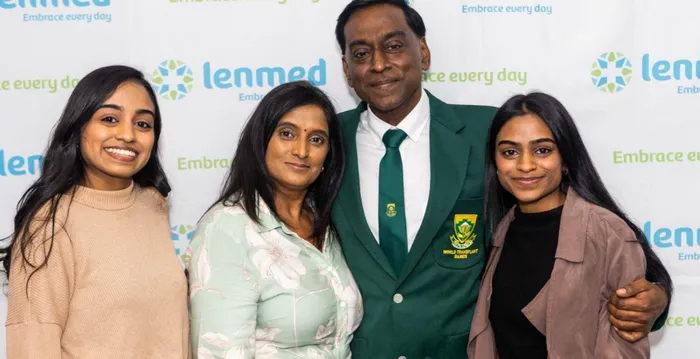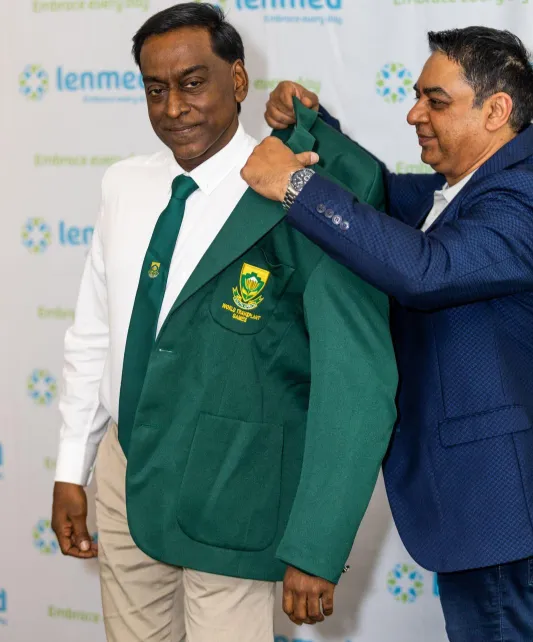Vivek Reddy's inspiring journey from kidney disease to the World Transplant Game
Triumph over adversity

Vivek Reddy with his his wife Selina and daughters, Tamika and Kelicia,
Image: Supplied
AFTER battling chronic kidney disease (CKD) and undergoing a successful transplant, Vivek Reddy shared his journey of resilience, family support, and determination as he prepares to compete in the World Transplant Games in August.
The 56-year-old father of two and former IT account executive, found out about his illness by chance in 2004.
“At the time, my daughter Kelicia, who was four-years-old, had presented with signs of early kidney disease. In the process of identifying the cause, the nephrologist had screened my wife and I to establish if there was a genetic link. After the screening it was established that I had already developed a more advanced stage of CKD, of which I was unaware of.
“CKD in most cases is difficult to reverse. The focus is then on placing the patient on a management plan to extend the usable life of the kidney for as long as possible. Also, until one reaches close to end stage kidney failure, there are no physical symptoms. Therefore the condition may only be detected when it is too late to manage.”

Niresh Bechan, the CEO of Lenmed eThekwini Hospital and Heart Centre, places the green blazer of Vivek Reddy.
Image: Supplied
Reddy said with regular visits to his nephrologist, a healthy eating plan and regular exercise, he extended his kidney function up to February 2015.
“This was when I reached end stage kidney failure - , having a kidney function of less than 15 %.”
He said this end stage failure was predictable based on his kidney function results.
His sister, Vijay Reddy, said she was willing to donate her kidney to Reddy.
However, a rare problem was identified on his sister's artery which made her unsuitable as a donor.
“Subsequently my brother, Derick Reddy and brother-in-law, Gino Manikam also offered to be donors. But they too were deemed unsuitable donors. My wife’s blood group was also incompatible with mine,” said Reddy.
In July 2015, Reddy was added to the organ donor waiting list.
“I was not hopeful of finding a donor. Emotionally it was difficult as I had always banked on the fact that I would receive a transplant from a family member, as we had planned.”
In August 2015, Reddy started dialysis and this meant significant changes in his lifestyle.
“I had to go to a dialysis centre three times a week for a session that lasted 4.5 hours a time. I had chosen the last session and would go straight after work to start dialysis around 5pm. I only got home after 9pm. I could not spend time with my daughters these days.”
Reddy was able to continue with his work with minimal disruptions. His saving grace came in 2016 when he received his new kidney after being on the donor list for a year.
“On April 5, I was driving to work when I received a call from Venessa Wentink – Regional Transplant Manager from KZN, who gave me the news that they had received a donor kidney that was a match for me.
“I was initially speechless while I tried to process what she was saying. I could not understand how from the long list of people waiting for a transplant, I was chosen. But I was so thankful. This was going to be my second lease on life. It was going to take away the uncertainty of dialysis and give me more time with my family. I could actually be there for my wife and daughters, and see them grow.”
He was told to go back home and pack quickly for admission to St Augustine’s hospital.
“The surgery took about four hours to complete. The next morning I was informed that the transplant was a success. The first four days in isolation were very difficult as I was not allowed any visitors or a cellphone,” he added.
Reddy was discharged from hospital seven days later.
“The food tasted better with the significantly reduced levels of toxins in my body and going from a very limited fluid intake while on dialysis, to now being encouraged to drink between 3.5 to 4 litres of water a day was fabulous.
“The first six months were quite challenging as there was a settling in period, where the nephrologist had to establish the correct levels of medication to ensure that my immune system could provide enough protection to the body, without rejecting the new kidney,” he said.
Reddy had complications with his graft and had to have a stent inserted.
Another setback was the fluid build-up around the kidneys for which the surgeon inserted a “drain” into his abdomen.
“When these initial complications was addressed, I was able to start living a normal and healthy life. The support which I received from my wife Selina has been incredible. She always made sure she was aware of my condition and treatment plan, so that she could help with managing, monitoring and ensuring that I followed the correct diet,” he said.
Shortly after his transplant, Reddy was made aware of the South African Transplant Sports Association (SATSA) and joined the KZN branch in 2019, with the intention of participating in the World Transplant Games (WTG).
“I saw this as the perfect way for me to show my appreciation of my second chance in life, and to honour my donor and donor family for this gift of life. The sport that I wanted to compete in was squash as I played this socially.
“Unfortunately, all did not go according to plan. I had started my squash training for the 2021 WTG, but that was cancelled due to the Covid pandemic at the time. In 2022, I began my training for the 2023 WTG, but I think I pushed too hard and snapped my Achilles tendon during a squash game. After successful surgery, I had to be in recovery for almost a year which ruined my chances then of participating.”
Reddy’s focus then shifted to the national qualification in 2024 for the WTG 2025.
“The nationals were held in Cape Town, in August 2024. Here, I was overcome with emotion and was so relieved when I qualified for the WTG 2025. This dream was finally becoming a reality. We had two training camps in Bloemfontein (FSSSI), where our fitness levels were measured and we were guided on areas of improvement,” Reddy said.
He said part of the excitement was the fitting of his South African apparel at the SA Blazer Ceremony earlier this month where they officially received their SA Protea blazers and spoke briefly about their transplant journeys.
“We received these blazers with a huge sense of gratitude and pride, knowing fully that this represented so much more. It was a celebration of life and our way of honouring our donors.”
Reddy has overcome many challenges besides his kidney transplant, to be where he is today, including poor eyesight and hearing loss.
“I would consider these just minor speed bumps along the way. My quality of life has improved so much since the transplant and I am grateful for my donor.
“My life was all possible because of one person that cared so much about others that they had enlisted as an organ donor. I am unable to fully express my gratitude and what this means to my family and I.
“For those in the end stages of kidney failure or on dialysis, you have to remain in a positive mindset, no matter what the circumstances. Never give up,” Reddy advised.
Related Topics: